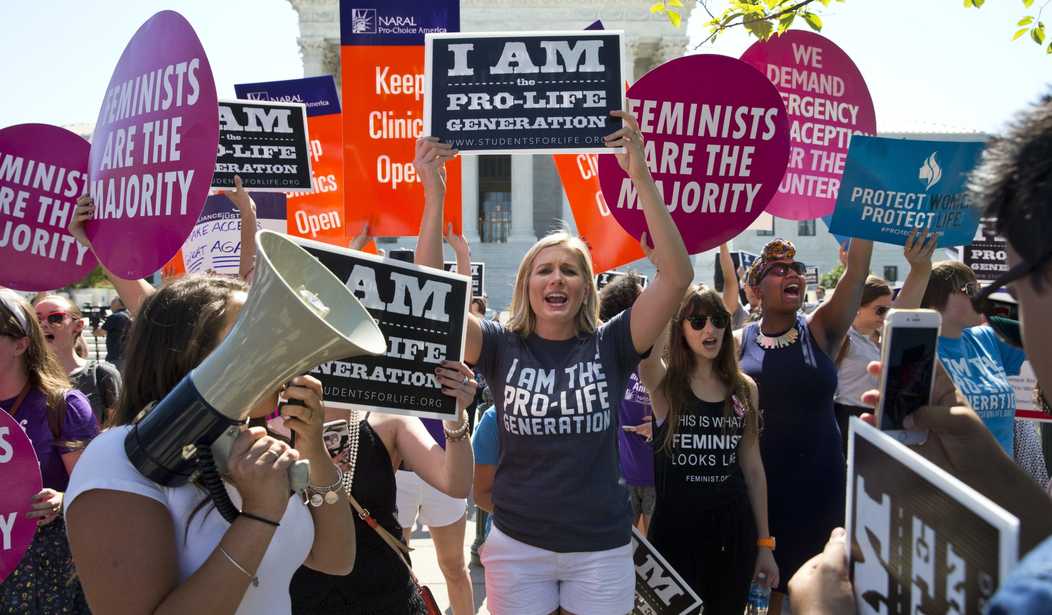Carol Tobias, the president of National Right to Life, told PJM she has no doubt the pro-life movement will hold on to legislative gains they made over the past two years in state legislatures across the country, despite a coordinated campaign to roll back the abortion restrictions.
“People will continue to elect pro-life legislators and those legislators will pass pro-life laws,” Tobias said. “There may be some that a court does strike down. But by and large most pro-life laws remain on the books, and I am not concerned that anybody in the abortion industry will be able to make any major change in that.”
National Right to Life wrote the book for political activism when NRLC rolled out model legislation on two high-priority bills — the Unborn Child Protection from Dismemberment Act and the Pain-Capable Unborn Child Protection Act — and showed pro-life state legislators exactly what its members wanted.
As a result, the Unborn Child Protection from Dismemberment Act and the Pain-Capable Unborn Child Protection Act are now the law in six and 14 states, respectively.
However, buoyed by her elation over a U.S. Supreme Court decision that struck down a 2013 Texas abortion clinic law, Helene Krasnoff, senior director of public policy litigation at Planned Parenthood Action Fund, said the organization is taking its pro-abortion-rights battle to at least eight state legislatures.
At the same time, the Center for Reproductive Rights filed suit against seven abortion laws passed by the Louisiana Legislature this year. It is only the first of what is expected to be a plethora of lawsuits aimed against states with laws the Center considers to be a violation of what it sees as a woman’s right to choose an abortion.
The U.S. Supreme Court, in a 5-3 decision, rejected a 2013 Texas law that allowed only doctors with admitting privileges at local hospitals to perform abortions. It also forced abortion clinics to meet the same standards as surgical centers.
The Supreme Court also refused June 27 to review two appellate court rulings that blocked similar laws in Mississippi and Wisconsin.
Later that day, Alabama Attorney General Luther Strange announced he would end the state’s appeal of a decision that found a similar Alabama law unconstitutional.
Krasnoff said the Supreme Court’s decision was a tipping point, which “removed the smokescreen that politicians have been hiding behind and revealed their true motives — ending access to abortion.”
Tobias said Krasnoff’s use of the tipping point metaphor is not only cliche, it’s obvious.
“The abortion industry is trying to set up this decision as a mirage,” Tobias said. “They want legislators, attorneys general, governors and whoever might be involved in enactment of a law to think that the Supreme Court will overturn any pro-life law that is passed.”
Missouri is one of the eight states being targeted by Planned Parenthood and the Center for Reproductive Rights because it requires abortion doctors to have hospital privileges.
Troy Newman, the president of Operation Rescue, pointed to the 60 times since 2009 ambulances have had to rush Planned Parenthood abortion patients to hospitals in St. Louis, Mo., as evidence abortion clinics need to be held to higher standards.
“When abortion businesses operate without regulatory oversight, women suffer, women die, and babies die,” Newman told Life News. “Unfortunately, the Supreme Court drank the Planned Parenthood Kool-Aid, and now, tragically, we can expect to see many more injuries inflicted by arrogant abortionists who hold themselves above the law.”
The Planned Parenthood legislative campaign will begin in eight states that have similar laws to those Texas restrictions that were struck down by the Supreme Court.
Legislators in Arizona, Florida, Michigan, Missouri, Pennsylvania, Tennessee, Virginia, and even Texas — because there are still some laws in the Lone Star State Planned Parenthood wants repealed —can expect pro-choice lobbyists to come knocking at their doors.
Dawn Laguens, executive vice president of Planned Parenthood Action Fund, vowed to fight “state by state and law by law…no matter how long it takes.”
Planned Parenthood plans to work with what a press release described as a coalition of partners and lawmakers to introduce repeal legislation, laws that expand access to abortions.
“We spent years building infrastructure to fight these laws: working with coalition partners, organizing grassroots supporters, and getting ready for the day our momentum would reach a tipping point,” Laguens said. “That day is now.”
Meanwhile, the Center for Reproductive Rights filed a federal lawsuit challenging seven abortion restrictions passed in Louisiana this year.
Nancy Northup, president and CEO of the Center for Reproductive Rights, said Louisiana passed the highest number of measures restricting women’s access to abortion in 2016.
The Center’s suit argues that each of the new restrictions is unconstitutional on its own and that collectively the restrictions “impermissibly burden women seeking access to abortion in Louisiana.”
“Louisiana politicians are trying to do what the U.S. Supreme Court just ruled decisively they cannot, burying women’s right to safe and legal abortion under an avalanche of unjustified and burdensome restrictions,” Northrup said.
“This law creates a web of red tape that women and their doctors cannot hope to escape, driving safe and legal care out of reach for many Louisiana women and putting their health and well-being at risk,” she added.
However, Deanna Wallace, Louisiana Right to Life’s legislative director, said the lawsuit “by the abortion industry is yet another reminder they are committed to abortion-on-demand without any common sense protections for the safety of the women.”
“Not only does the abortion industry wish to avoid those safety standards,” Wallace added, “but in this lawsuit they are also defending their ‘right’ to use the completely barbaric procedure of dismemberment abortion in order to rip living, unborn human beings limb from limb.”
Tobias isn’t surprised that pro-choice advocates are not relying strictly on legislative lobbying to change abortion laws.
“The only way they are going to be able to make gains is through the courts and trying to get laws struck down,” Tobias said. “The abortion industry does not have popular support. They do not elect legislators. They are not going to pass laws or repeal them.”









Join the conversation as a VIP Member